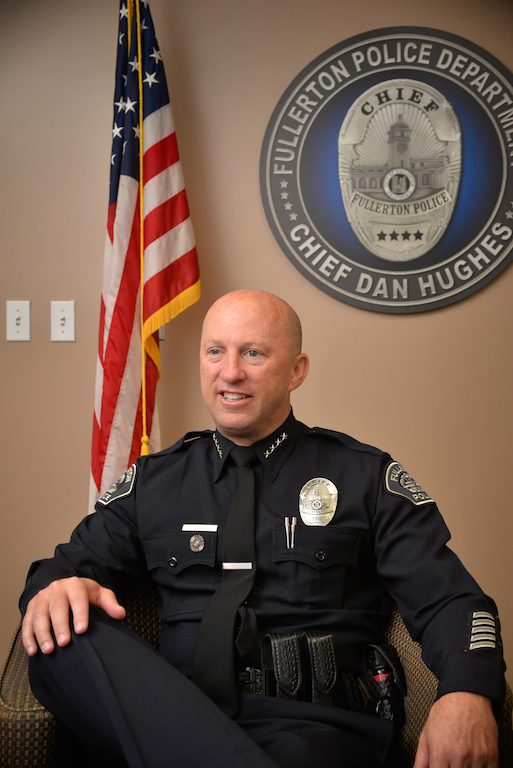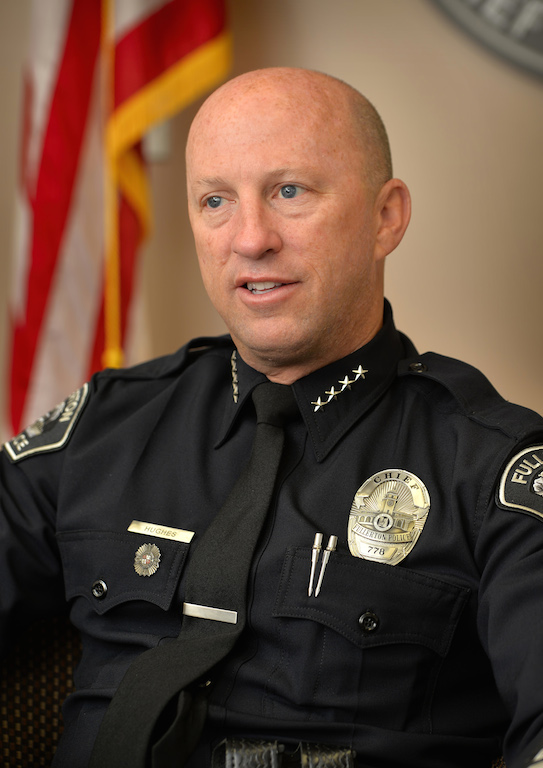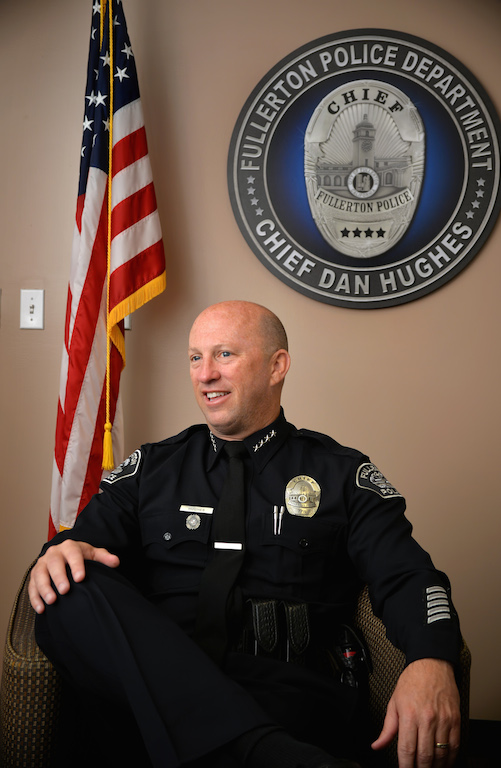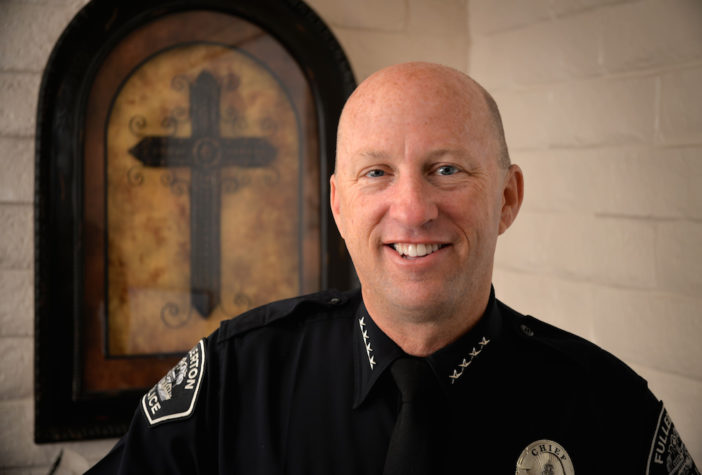Editor’s Note: Behind the Badge OC recently caught up with Fullerton Police Chief Dan Hughes to discuss the state of his agency and the broader picture of policing in America today. Hughes, 50, started working for the Fullerton PD two weeks out of high school as a cadet. He took over the department as acting chief in January 2012 and was unanimously elected permanent chief by the City Council in August 2013.
Q. President Obama and others say mistrust of the police, especially in minority communities, is one of the biggest national issues today. How are you building trust?
A. I don’t necessarily agree there is widespread mistrust of police. I will tell you here at Fullerton PD, I have experienced the complete opposite. We are engaging with our community on an ongoing basis. I’m receiving more calls and email than ever before about the great work our police officers are doing. So I haven’t experienced that.
We actually have a community that wants to be engaged with the police department, and I don’t think that’s by accident. We have actively made attempts to engage our community, but we’ve done things that are not the norm. We realized that we actually have to go out and talk to people who don’t necessarily agree with us on every topic, and that has really helped us build some trust and relationships.

Fullerton Police Chief Dan Hughes talks about his career and the challenges the department faces.
Photo by Steven Georges/Behind the Badge OC
Q. How are the body cameras working out?
A. They’ve been tremendous. The interesting part is there really hasn’t been a challenge with them. The transition has been fairly smooth for us. We already had digital audio recorders per policy, so for our officers the transition was an easy one.
We haven’t had much feedback other than the fact that those who have called us asking about it have been happy that we have them. What I’ve noticed so far is there hasn’t been as much of a change in the conduct of the police officers as there has been on a change in the person an officer is talking to when they realize they’re being videotaped. Thus far, they’ve been great in terms of evidence and ensuring that our officers are making the proper ethical decisions in the field.
Q. There has been a lot of concern that the passage of Prop. 47 (the Reduced Penalties for Some Crimes Initiative) might lead to a spike in crime, especially violent crime. What’s your take on that? Are you seeing that?
A. So far I don’t know that there’s anything we can actually look at that proves crime is going up specifically because of Prop. 47, at least here in Fullerton, but I will tell you crime is going up — especially property crimes. And many of the people that we are arresting have been released pursuant to Prop. 47. I certainly think Prop. 47 is going to have a significant impact not only on our community but how police look at the trends that happen in their cities.
Q. Is this rise in property crimes concerning to you? And are you concerned about other crime trends out there?
A. I think the biggest concern is yes, property crimes are going up and at least in the city of Fullerton, and aggravated assaults also are on the rise. And so when you look at crime trends and look at the fact that many of the crimes being committed in Fullerton are being committed by those who have a high recidivism rate, there’s a revolving door — and that’s certainly concerning.
Q. Do you have any suggestions for residents on how to be more safe?
A. The biggest one is if you see anything suspicious, call the police department. We want people to engage with us either by social media or by the information we’re putting out to them. We want them to sign up to get emails from the police department about crime trends.
I think a community that engages with its police department results in lower crime and a better understanding and awareness of what’s going on around them. But even more so, it helps when neighborhoods begin taking care of themselves and get connected with public safety. For example, a person may notice when the widow down the street hasn’t been seen in a while. Does she need help? These are the types of things we’re trying to do that may not fall under the category of common types of policing.
A big example of this is Love Fullerton (May 9 community volunteer event; see related story here), where we’re having more than 3,000 people show up simply to get involved with their community to make it better. To think that over 3,000 people would actually give up their day to help people they may never know or see speaks volumes about this community. And I believe it’s important for law enforcement to lead that sense of serving other people.

“Our goal is to be the most progressive police department in the region.”
Photo by Steven Georges/Behind the Badge OC
Q. Your department has new leadership at all levels. How’s that working out?
A. It’s been great. It’s an exciting time. Sometimes change is difficult, and I certainly understand that. But it’s also a great opportunity to reflect not only on how are we’re doing, but also how we can get better? It doesn’t necessarily mean that things were wrong before, but that we can always do a better job. And I think one of the things we’re hoping to achieve as a department this year is to continuously make assessments such as how do we make changes so we can be more effective as a police department?
Q. What does your Chief’s Advisory Board do?
The chief’s advisory board is something I created a year ago. It’s made up of about a dozen individuals from a wide variety of backgrounds. I wouldn’t say they dislike the police, but they certainly are very objective in terms of police issues. And that’s really what I wanted. I didn’t want people to tell me what I wanted to hear. I wanted people who were going to be very honest and straightforward, and that’s what we have on our current board.
Q. You wanted a diversity of opinions.
A. Yes, very diverse. And that’s been really exciting.
We began with training to expose them to different aspects of the police department. And I thought the important part was they weren’t just hearing from a police chief — they actually were being trained by individuals who were doing the work.
Members of the Chief’s Advisory Board have complete access to this department. They can walk around and go on ridealongs and talk to detectives and staff members alike. They can do whatever they want in terms of finding out information about our department.
We meet on a monthly basis to discuss a variety issues, and a lot of important things have come out of these meeting. For example, advisory board members were the first people that I brought the concept of body cameras to and asked, do you think it’s a good idea? And what about the policies I’m going to create because of body cameras? Should the officers review the videotape before they write their reports, should we release the videotape to the public? There were a number of different issues they looked at. They researched these issues and provided me with feedback that I thought was invaluable in developing policy.
What I made very clear to them is that they don’t set the policy for the police department, but they certainly have an influence on the policy. Another thing we discussed is why police officers sometimes use force. We put them through scenarios where we actually had them assume the role of a police officer with simulated weaponry including guns. They had to then try to control a bad guy. One of the board members was shot within 20 seconds, and two other ones shot an unarmed suspect.
What we really were able to do is discuss the challenges of policing and how, from their perspective, they see how the police department can do a better job. It was really eye opening to see how they would have handled things differently, with some of the minimal training they received.

“Sometimes people don’t realize police officers often have a strong sense of faith. I have a deep and committed belief system.”
Photo by Steven Georges/Behind the Badge OC
Q. What’s one thing about the Fullerton Police Department most residents would be surprised to learn about?
A. Just what a commitment our officers make to this city. It’s not just a job for them. It’s a calling they’ve completely embraced. Our officers are completely invested in the community, and I think a lot of time people fail to realize how much these officers, not only while they are on duty getting paid, but off duty, how much they provide to this community. They just want to serve and make Fullerton the best community in Southern California.
Our goal here is to be the most progressive police department in the region. I don’t know if we’re there yet, but we certainly are on a great path to get there — and that’s due to the commitment and great work of our police officers.
Q. What are you doing to reduce crime in downtown Fullerton?
One of the things we’re doing is taking a scientific look at crime and asking ourselves how to take the data and the elements of crime and allow that to help us better allocate our resources to problem areas. It’s everybody’s job at our police department to try and identify crime trends and come up with creative ways to reduce crime or eliminate it. I’m extremely excited that we have people who are committed to doing that.
We’ve looked outside of our police department and have talked to other agencies, and as recently as last week we had a professor from the University of Northern Texas do an assessment of our department not only in terms of our level of staffing, but what type of policing we’re doing.
I’m very, very pleased to see that he believes that we, from a scientific viewpoint, are on the right path and are one of the most progressive departments in terms of not only how we relentlessly pursue criminals, but also how we engage with our community and the level of customer service we provide. We investigate crimes that a lot of police departments don’t because we believe that’s the type of service we should provide to our community.
Q. How would you describe your agency’s relationship with the Fullerton Fire Department?
I think what’s unique about our city is really how closely we work with our fire department, and how much we respect what they do. We are on calls on a nightly basis with them. I meet with our fire chief probably every couple of days to talk about various things that impact our community. I just think they do a wonderful job and that they’re the best fire department I’ve come across in Orange County. We’re very fortunate to have them and to have a very close working relationship with them.
Q. What keeps you up at night?
A. I’m a very blessed individual. I feel really confident that we have very strong leadership here at this police department. I’m very comfortable in knowing that we have captains, lieutenants and sergeants that are some of the best in Southern California. And that gives me great peace.
But, I’m always concerned that I’m going to get the call that a police officer has been hurt or a police officer has been killed or that there’s been an incident involving a police officer or that a community member has been hurt. Those are the things that concern me when the phone goes off at night. However, I’m extremely confident in the leadership of this organization. It’s strong, and it’s only getting better.
Q. What’s something outside of police work that residents would be surprised to learn about you?
A. Sometimes people don’t realize police officers often have a strong sense of faith. I have a deep and committed belief system, and the values of that belief system help shape and form me as a police officer and as a police chief. Many of us have a strong belief system and are involved in our churches and in our community and are trying to be better people.
Some people may be surprised to learn there are many times when I will be in my office not just looking at reports, but that I may be on my knees praying for this city and for this department, and not only for the safety of our police officers, but for the entire community.
Q. What do you like most about your job?
Absolutely everything. This community has just been amazing. It’s great to see not only a community that gets behind its police department and demonstrates incredible support for it, but also to see the police officers truly believe in what they do. I call what we do here policing with a purpose. Our officers believe in this higher calling to provide the best service to help keep our community safe. I couldn’t be more proud. I wish I could say there’s a better job, but I can’t think of one.
 Behind the Badge
Behind the Badge



